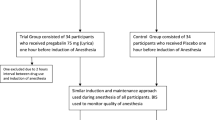Abstract
· Objective: The purpose of this study was to evaluate the antiemetic effect of prophylactic dimenhydrinate application prior to Faden operation and to compare the incidence of PONV between bimedial Faden operation (BMF) and horizontal recess-resect procedure (R&R). · Methods: Ninety-nine children (4–10 years) scheduled for BMF were included in this prospective double-blind study. Midazolam (0.5 mg/kg body weight, BW) was administered orally for premedication 30 min before induction of anesthesia. Additionally, children weighing ≥23 kg received either dimenhydrinate suppositories or placebo. The placebo group was compared with 148 children who underwent R&R surgery without antiemetic prophylaxis during the same period. Anesthesia was induced with thiopentone (5–10 mg/kg BW) and vecuronium (0.1 mg/kg BW) bromide and maintained with halothane (1–2 vol%) in N2O/O2 (65/35 vol%). Age, height, weight, and incidence of oculocardiac reflex were documented. PONV was classified into ”no vomiting”, ”vomiting without therapy”, and ”vomiting requiring rescue medication”. In the latter case dimenhydrinate was given again. The chi-square test was used for statistical analysis. · Results: Forty-eight patients received placebo, while 51 received dimenhydrinate. No differences between any groups were observed concerning age, height, weight, and incidence of oculocardiac reflex. Compared to R&R surgery, PONV requiring rescue medication occurred significantly more frequently after BMF (45% vs 23% after R&R). PONV after BMF was significantly less severe in the dimenhydrinate group than in the placebo group. The total incidence of PONV after BMF, however, was not significantly reduced. · Conclusion: The high incidence of PONV after BMF can be explained by the greater invasiveness of BMF than R&R surgery. PONV requiring antiemetic rescue medication can be reduced by preoperative administration of dimenhydrinate suppositories.
Similar content being viewed by others
Author information
Authors and Affiliations
Additional information
Received: 3 November 1998 Revised version received: 5 February 1999 Accepted: 18 February 1999
Rights and permissions
About this article
Cite this article
Welters, I., Graef, M., Menges, T. et al. Postoperative nausea and vomiting after Faden operation. Graefe's Arch Clin Exp Ophthalmol 238, 59–63 (2000). https://doi.org/10.1007/s004170050010
Issue Date:
DOI: https://doi.org/10.1007/s004170050010




